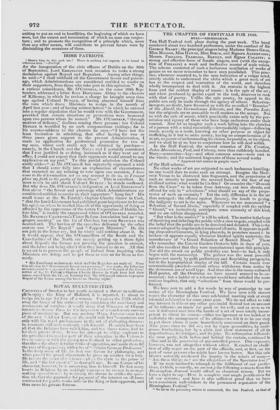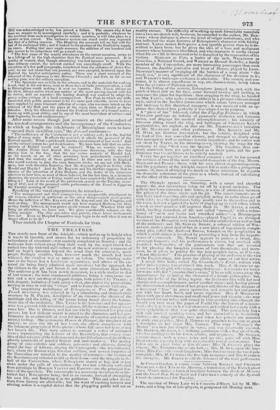THE CHAPTER OF FESTIVALS FOR 1840.
HULL.—BIRMINGHAM.
THE Hull Festival took place during the past week. The band numbered about two hundred performers, under the conduct of Sir GEORGE SMART ; the principal singers being Madame DORUS GRAS, Miss MASSON, Miss IIAWES, Miss BIRCH, and Signora ALBERTAZZI; Messrs. Pommes, PEARSALL, BENNET, and Signor CoLsrm; a strong and effective force of female singers, and (with the excep- tion of Pnicmos) a weak and ineffective muster of male voices. The scheme consisted of such a barbarous mutilation of works of genius as we never remember to have seen paralleled. This prac- tice, whenever resorted to, is the sure indication of a vulgar mind, utterly unable to understand the claim which a great work of art has to the respect and veneration of the world, and therefore wholly incompetent to deal with it. An oratorio is the highest form and the noblest display of music : it is the epic of the art ; and when produced by genius equal to the task, deserves to rank with that of poetry. Unlike the epic poetry, its appeal to the public can only be made through the agency of others. Selection- mongols, no doubt, have favoured us with the so-called " Beauties" of the 21:neid, the Gerusalemme Liberata, and the Paradise Lost; but the originals arc as accessible to all readers as the scraps. Not so with the epic of music, which practically exists only by the per- mission and agency of those who have large orchestras under their
control. Now let us imagine such a work falling into the clutches of a person with a mind essentially—irremediably vulgar—following music merely as a trade, knowing no other purpose or object for trafficking in it but to make money, having no comprehension of it as art, no power of understanding its claims, its position, or its object, and we shall be at no loss to conjecture how he will deal withit.
In the Hull Festival, the several oratorios of The Creation, Judas Maccalaeus, Paul, and Calvary, were thus ruthlessly handled. Story—connexion—key—and often common Sense—were cast to the winds; and the scattered fragments of these several works 0 Apparent rani nantes in gurgitc vasto"
of the Hull scheme.
No other works of art are subjected to such barbarous handling: no one would dare to make such an attempt. Imagine the Medi- cean Venus to be shattered into fragments, and the perpetrator of such an atrocity to parade the severed limbs in the face of any civilized nation: what would be his fate ? Or conceive the "Descent from the Cross" to be taken from Antwerp, cut into shreds, and offered for sale in " selections :" what should we say of the perpe- trator of such an enormity ? Yet the only difference is in the art thus outraged : the offence against decency, the insult to genie . the indignity to art is the same. Whenever we see announced " a Selection of Sacred Music," especially if coupled with the epithet " Grand," we insinctively anticipate some enormity of this kind, and we are seldom disappointed.
"But what is the motive?" it will be asked. The motive is thehope of deceiving and deluding the public with a view to gain, coupled with the belief that the public are to be deceived and deluded. This is the course adopted by unprincipled traders of all sorts. It appears in puff- ing shop-advertisements, in lying placards, in promises meant t.. be broken—it appears equally whenever kindred spirits undertake the manufacture of "a Grand Selection of Sacred Music." Those Who remember the Covent Garden Oratorio bills in days of yore, will also recollect that they were manufactured upon this principle. Nor did the attack on public credulity end here—in fact, it only began with the manuscript. The printer was the most powerful agent—not merely by puffs preliminary and flourishing paragraphs, but in the typographical display of the bill. Certain words were ostentatiously paraded—certain others withdrawn from notice by the dexterous use of small type. And thus also in the many-coloured Hull poster, all the Oratorios we have named seemed to be an- nounced ; but a ladder or a telescope would have satisfied the more curious inquirer, that only "selections" from those would be per- formed.
We have now to add a few words by way of postscript to our notice of the Birmingham Festival. We have seen with sincere regret the character of this once celebrated meeting sink at every triennial celebration for some years past. We do not affect to take any interest in this or any other provincial festival but on account of its influence cm music ihr good or for evil ; and as soon as we saw it delivered over into the hands of It set of men totally incom• potent to direct its course—either too ignorant or too indolent to undertake the management of its aflairs—we felt it to be our duty to put those whom it more immediately concerned on their guard. Nine years since we did ; mt by vague generalities, by ambi- guous fbrebodings, but by a plain and clear statement of all its imperfections, its intrigues, and ifs jobs. No reformation followed: the same party, both befine and behind the curtain, continued in Oita; and in the possession of uncontrolled power. Our exposure, However, was not altogether without effect. It excited an ebulli- tion of silly zinger on the part of the officials, and, at first, on the part of some persons oho might have known better. But this vain bluster naturally iINV:II■Cried the inquiry in the minds of many—, Are these things n y are the idle/set ioos of the Spectator trite?' If' we were inclined to triumph in the fulfilment of our probe- ti011s, (which, nssuredly, we are not,) the f'ollowing extracts from the Birmingham Jourhal would a fibril us abundant reason. But we have a right to say—Here is complete and ample justification for all our censure ; and here is also sufficient proof' that we have been consistent well-wishers to the permanent reputation of the Birmingham Festival."- " So fur as tire pecuniary return is concerned, the late Festival, as that of' 1837 was acknowledged to be, has proved a failure. The causes why it has been so, require to be investigated carefully ; and it is probable, whatever be the aversion from such investigation in certain quarters, it will take place to a greater or less extent. The exclusive system can stand under any reproach but that of a falling revenue. The Hospital, the accounts tell us, had sold the last of its exchequer bills; and it looked to the produce of the Festival to supply its wants. Failing that once ample resource, the addition of one hundred and fifty names to its subscribers will go a small way. " The first cause of the scanty attendance on the recent occasion, seems to be a falling-off in the high character that the Festival once possessed. It is worthy of remark, that, though advertising was had recourse to to a greater than ordinary extent, the interest excited was exceedingly small. With the exception of a few puff paragraphs, transferred from the columns of Aris's Ga- zette, we are not aware that one journal, our own excepted, bestowed upon the Festival the briefest anticipatory notice. There was a short account of the rehearsal of the Lohgesang in the Morning Chronicle; and that, so far as our reading goes, was the solitary exception. " The Spectator saw so little in the scheme, and in the materials for working it out, that it did not deem, even in these days of facile comm aaaa kation, a visit to Birmingham worth making : it sent no reporter. The Times, always on the alert, always active when any matter of the most passing import calk for its notice, sent no reporter : the leading Journal was content to adopt the penny-a-line critique of a local correspondent. Tile Post, to which any trifle connected with public amusement is for the most part valuable, seems to have been supplied by some itinerant collector of straps, who was more intent on the columns of the Hall and the pipes of the organ than on Handel or Men- delssoliu. Only the Chronicle deemed the Festival worthy of a formal notice ; drawn up with great ability, and by one of the most benevolent of critics—and from beginning to end condemnatory." After some severe though Just censures on the misconduct of the musical arrangements and the incompetency of the Conductor, to which at length the inhabitants of Birmingham seem to have " opened their unwilling eyes," the Journal continues- " The inefficiency of the 6miluctor is not a solitary evil; it is the fruitful father of many more. It affects the »zateriel ; it affects the personnel Of the Festival equally. 'What a patchwork was the entertainment of last week ! And yet the extract system has got its defenders. We have been told that an entire oratorio of Handel would not be endured ! Who, we wonder, was the 3Ir. Justice Midas that hinted this ingenious discovery, with the fact staring him in the face, that the one entire oratorio of Bendel bail, on the recent, as on all other occasions, been preeminently successful ? And then the modesty of these garblers! Is there one man in Englaed who would venture to play the Mlle fantastic trick:, we say nut with Sheik- spere, but with Sheridan Knowles, that Mr. Knyvett played on Fridty with Bendel and Haydn ? And do Mr. Knyvett and his abettors suppose, that in absence of the attraction of John Brabant, and the desire of his nonagons admirers to hear him, as most of them believed, for the last time, in a favourite character, the patchwork of Friday would not have emptied the Hall, instead of filling it ? Look at the result of the patchwork system on the Tuesday morn- ing of 1837, and of the promised entire performance of the Israel in Eyypt ou the Tuesday morning of 1840!"
Speaking of the vocal engagements, he remarks- " The management and their manager have an irrepressible attachment to old women, whether in petticoats or the other things—simile simili !pnkt.
Bence the infliction of Mrs. Knyvett, and Mr. Knyvett, and Mr. Vaughan, and such as they. The management would not have engaged Bedlam, but that, as they fondly believed, he was grown an old woman too. Whether 18-13 will bring an alteration, we know nut. We place considerable reliance on the falling receipts. The dire neetssitos may prevail, where lesser incitements have not Even on Hospital Committee may begin to do well when it can no longer afford to do ill."
Thus endeth the Chapter of Festivals for 1840.



























 Previous page
Previous page